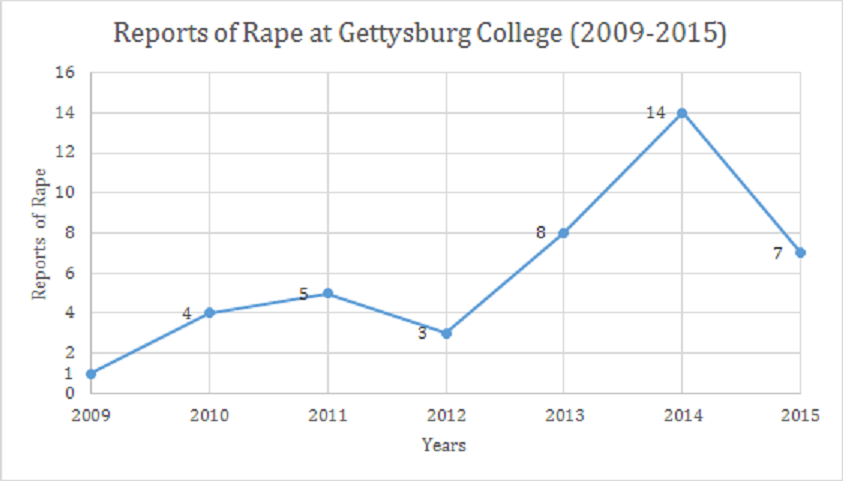Reports of sexual assault at Gettysburg College have skyrocketed: Director of Public Safety provides insight

Reports of rape based on data in the annual campus fire safety reports; with six reports of rape
already this fall, that number seems likely to climb in 2016.
By Benjamin Pontz, Staff Writer
It’s become like clockwork. With the exception of last week, there has been one report of a sexual assault or case of intimate partner violence on the Gettysburg College campus each week since students arrived at the end of August. In September, Title IX coordinator Jennifer McCary stated simply on the college’s daily email digest: “This has to stop.”
Since then, four more incidents have been reported via the college’s timely warning system, part of compliance with the federal Clery Act, which mandates disclosure of campus crime statistics. Six incidents of rape have been reported thus far this semester which is on pace to exceed the record of 14 reports set in 2014. One incident each of fondling, dating violence, stalking and domestic violence has also been reported.
Gettysburg’s director of public safety, Bill Lafferty, does not know whether the increase in these reports is signifying an increase in crimes overall or is an increase in the number of people that are reporting these crimes. Either way, he is unnerved by the numbers.
“One is an alarming number,” Lafferty said. “It’s sad to know that our students are experiencing these issues.”
Since the passage of the Violence Against Women Act in 2013, a “game changer,” according to Lafferty, colleges across the country, including Gettysburg, have been required to provide extensive bystander training to students and increase the number of responsible mandatory reporters. Based on those factors as well as national data suggesting sexual assault crimes are significantly underreported, Lafferty believes there are still unreported cases of sexual assault occurring on campus. Data from the recent Campus Climate Survey indicating that 10 percent of students report experiencing unwanted sexual contact ostensibly corroborates Lafferty’s belief.
In 2015, the college had seven reports of rape, five of which Lafferty estimates were reported more than a year after the fact. In other words, no timely warning was triggered because there was no discrete or imminent threat. With regards to timely warnings, the College’s general policy is to issue a timely warning when an incident occurred within the preceding two weeks. Six timely warnings have been issued to date this semester. Notably, Lafferty says that most of this year’s reports have come from victims as opposed to third parties.
“Victims feeling comfortable to come forward is not a bad thing, and they are coming forward in a timely manner, which allows us to respond very differently in terms of the resources we provide,” said Lafferty.
Timely warnings do pose a challenge in terms of avoiding information that may identify the victims. Specifically, the college avoids mentioning the residence hall in which an incident occurred because on a small campus of 2,550 students, it’s highly likely a victim will be inadvertently identified. Given national statistics that show fear of retaliation or social ostracism as major reasons victims do not report incidents, Lafferty takes every precaution to prevent inadvertent victim identification.
“Our goal is to let the campus community know that sexual assaults are occurring at Gettysburg because oftentimes students think they don’t happen here and they do,” said Lafferty, “and to provide them with information to create an awareness … to reduce the likelihood of future victimization.”
This contrasts with an approach to release information about crimes against property. Specifically, a burglary occurred in Musselman Hall on Oct. 23; such information was released to the campus community in a timely warning. Lafferty emphasizes the distinction between crimes against people and crimes against property.
“I don’t know that [the warning message] identified the victim. Certainly if people in Musselman see a door that’s damaged they could see that that’s the victim, but we’re really sensitive about crimes against persons, so we look at that differently. Sexual violence is very different in terms of the trauma associated with it,” said Lafferty.
When DPS issues a timely warning, the goal is to inform students of their surroundings, provide information on how to prevent such crimes in the future and facilitate awareness and discussion of issues salient to the campus community. Particularly because most instances of sexual assault occur between students who know each other and when either the victim, the perpetrator or both are intoxicated, Lafferty does not think providing specific information about the location or other circumstances would further the goal of the warning.
Moving forward, the institution continues its efforts at prevention. There is no silver bullet to eliminate such efforts, however, and the process will not end anytime soon.
“If there’s a silver bullet, I don’t know what it is,” said Lafferty. “I think education, awareness, accountability and responsibility are the way to go. The awareness piece is huge: intervention, risk reduction, all those things.”
The college recently secured a $300,000 grant from the U.S. Department of Justice to further institutional efforts to prevent sexual assault. GreenDot Training is another pivotal component to the institution’s efforts; increases in bystander reporting do seem to speak to the training’s impact. Students are driving institutional efforts to combat sexual assault on campus as manifested through participation in college committees, student organizations such as Students Against Sexual Assault and in their daily interactions with peers.
As alarming as both the frequency and nature of the reports has been this fall, Lafferty emphasizes his excitement with new initiatives and ongoing projects on campus and suggests that Gettysburg is ahead of many other institutions in grappling with these issues because Gettysburg is beginning to see more people comfortable reporting crimes.
“We know this is an issue nationally but we also recognize that it’s a problem on our campus,” Lafferty said. “My hope is that our students feel more comfortable reporting because they want the college administration to know that this is happening.”
